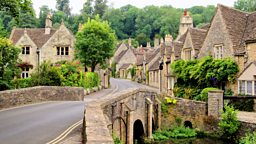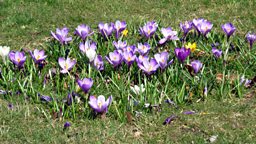Talk of the town: how where you live got its name
Taking the B-roads and branch lines from Ashby-de-la-Zouch down to Zennor, stopping off along the way at Great Snoring and Nempnett Thrubwell, Word of Mouth is exploring the origins of some of the UK’s most extraordinary place names.

Michael Rosen and linguists Dr Laura Wright and Professor Richard Coates discuss the meanings behind the most common village name formations: how did some of the stranger titles for towns come about? And what does the astonishing array of place names tell us about the history of the British Isles?
1. The oldest place names come from the landscape
As the last ice sheet retreated about 10,000 years ago, and temperatures began to warm up, humans began to repopulate the British Isles. And they started to label the things they saw. Places named after local geographical features are the oldest type of names in both the Celtic and Anglo-Saxon languages.
- Rivers: Some of the ancient river names are completely uninterpretable to us even today, like Severn, Test, Itchen and Trent. Some of those early river names were built into later place names like Exmouth (the mouth of the river Ex).
- Hills: Numerous hills are enshrined in place names containing the suffix don, the old word for hill (eg. Wimbledon or Huntingdon). Pen actually means head in Welsh but it is also used to name hilly places. That may have been the way the English dealt with it when they heard it being uttered by Celtic speakers.
- Valleys: Places containing dale, dean, dene, combe, coombe, slad or slade all relate to valleys (eg. Rottingdean). And let us not forget that the presence of a bottom (eg. Ramsbottom) almost always means valley.
- Fords: Places with shallow river crossings often contain the suffix ford (eg. Stamford).
- Rocks: What does the Cloud in Temple Cloud mean? It’s not what you might expect. In Old English the word means a towering rock or a precipice. It has only recently come to mean the fluffy white things in the sky.

2. There’s a suffix that tells us somewhere is an island
There is one suffix that occurs repeatedly around the country: many islands end in y, ey or ea like Lundy (puffin island), Mersea in Essex (mere island), or The Isle of Sheppey in Kent (sheep island).
If your place name ends in some form of ey it’s possible it used to be an island!
3. Lots of places are named after landmarks added to the landscape by our ancestors
- Berry or bury: This was used to describe the site of a hill fort.
- Ton: This word ending, that remains very familiar today, was used to describe a settlement. A name ending in ton refers to a farmstead or village.
- Wich, wych or wick: This relates to some sort of specialised farm, and turns up in places like Droitwich, Nantwich, and also the Aldwych in London.
- Ham: This has two origins. Sometimes it comes from the Old English word, which is the origin of our word home and seems to refer to a big farm or a substantial enterprise. But sometimes it refers to a much smaller feature like pasture on the edge of a river, particularly on a meander.
- By: Simply put, this is a Viking ton – it’s the basic Norse word for a farmstead or small village, frequently used in Norfolk, Lincolnshire and up into Yorkshire (eg. Whitby). We can be in no doubt as to where the Danish Vikings landed!
- Toft: This is the Viking word for a smallholding, evidenced in the name Lowestoft. It was actually taken over into English as a legal, technical term: you held toft and croft if you had a small portion of land where you built a house, where you could do market gardening.
- Thwaite: This is a Viking word for a clearing in a forest and a settlement that’s put there.

4. There are places named after people
Personal names are also part of the typology of place naming. Most of the personal names added by English speakers are built into words that represent settlement or landscape features.
For example, Birmingham, Brighton and Bedminster all combine English words like ham and ton with the names of individuals. Brighton is the settlement of someone whose name amounted, in Old English, to the word bright, plus the word helmet.
There are enough Kingstons and Bishopstones to make us think it was the most important people who had the places named after them.
-
![]()
Word of Mouth: How Places Got Their Names
Michael Rosen and guests explore the origins of the UK's town and village names.
5. There are places named after trades
What do Croydon and Saffron Walden have in common? No idea? Well, it’s all to do with the growing of crocuses.
Croydon comes from the Latin word for crocus (which is crocus!) borrowed into Old English, causing the pronunciation to change slightly, and don meaning valley. It looks like Romans came over with the crocus, which is not native to the UK, and planted it in this valley.
A few hundred years later, during the Crusades, lots of Brits travelled over to the Middle East where they picked up crocus plants but with a different, Arabic name: saffron. They brought them back and planted them, giving birth to Saffron Walden.
We have all heard of Billericay in Essex but there were other Billericays in Kent, Wiltshire and Somerset. The word means tanning house, where the tanning of leather hides was done. Perhaps surprisingly, it comes from an Indian word meaning the fruit of a very particular tree, which would have be dried and brought over to England in powdered form as a source of black dye.

6. There are also place names that reveal where it was hard to make a living
It’s hard to believe, but there is actually a place called Pity Me, now a suburban village in Durham. Like the common English field name Starve-acre, these are names given to places where it was considered hard to prosper.
Originally, Nottingham was known as Snottingham, because of the Germanic and Saxon settler influence on place names.
Not far away from Pity Me was the tiny village, a couple of rows of railway cottages, named Linger and Die – perhaps related to the nickname for the nearby Leasingthorne Colliery.
7. Not all Latin place names are because of the Romans
We know there are places named by the Romans: Catterick in North Yorkshire, for example, evolved out of the Roman settlement Cataractonium. And we were all taught at school about the Cesters and Casters: Leicester, Bicester, Lancaster, and Cirencester to name but a few.
But we also know that William, Duke of Normandy’s administration, which surveyed the country for tax purposes, wrote down all the places they came across, in Medieval Latin. Weston-Super-Mare provides a good example of this: the Latin word mare is used instead of sea.
8. Our place names are more German than French
The Germanic and Saxon settlers had much more of an influence on our place names than the French - French place names are actually very small in number. But you do see the impact of the Normans in other ways: sometimes they couldn’t quite get their heads, or tongues, around local pronunciation.
Originally, Nottingham was known as Snottingham but, because the French don’t have words that start with Sn, the S soon disappeared. What a shame: Snottingham does have a certain ring to it.
-
![]()
Word of Mouth: How Places Got Their Names
Michael Rosen and guests explore the origins of the UK's town and village names.
-
![]()
Nine things you didnβt know about hedgehogs
The adorable mammal with a dark past...
-
![]()
Mizzle and smirr: 13 British words and phrases for rain
Fine drizzle or a wet-to-the-undies downpour, the Brits know a thing or two about rain.
-
![]()
What do the words you wear say about you?
Slogan clothing is having what fashion insiders might call βa bit of a momentβ.




